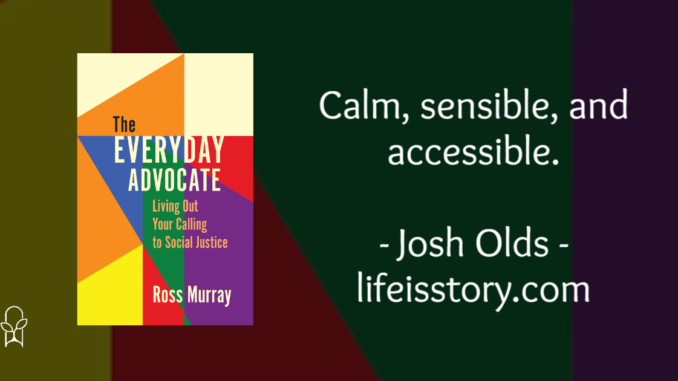
Published by Fortress Press on May 9, 2023
Genres: LGBTQ+, Non-Fiction, Social Justice
Buy on Amazon
Goodreads

As Christians, we are called and anointed to bring good news to the poor, release to the captives, and freedom to the oppressed. In The Everyday Advocate, Ross Murray helps Christians explore our individual callings to justice and start taking practical steps to live that out.
The Everyday Advocate is for the layperson who feels overwhelmed by the world's troubles and helpless to address them. It is for the person who goes to church, hears the gospel, seeks to apply it to their lives, and yearns to be connected to, or create, a community that amplifies their voice and actions. It is also for pastors and faith leaders who want to help people think through their calling to advocacy and help connect them with the communities that can use their gifts and talents.
Murray builds on two questions: Where is God? And what are we called to do? Viewing every action and phenomenon as theological, he stakes out values and shows readers how to work toward those values. He also distinguishes between direct service and cultural change, discussing the balance between them and acknowledging both are needed.
Drawing on his own experience and exercising his pastoral spirit, Murray encourages readers to discern their own call to advocacy, learn to identify injustices that still reign, and respond faithfully by incorporating big and small actions into their everyday lives.
When it comes to the work of advocacy, there’s so much to do that it can be overwhelming to know where to start or how to feel effective. I’ve watched protests and felt like I was doing nothing because my only contribution had been a Facebook post. I’ve been to protests and felt like I was doing nothing because, in the aftermath, nothing really changed. I’ve made efforts to personally reduce my carbon footprint, recycle, and so on, but then a millionaire’s private jet produces more Co2 in one flight than I could reduce from my own self in a year. The problems are so big and the average person’s resources are so small that it can be discouraging to even begin—and you begin to wonder why you should even try in the first place. Ross Murray, VP of GLAAD Media Institute, understands this and calls readers toward a prophetic and constructive path toward justice that focuses on making real and substantial changes in one’s everyday life.
The Everyday Advocate understands that the challenge is daunting. Even more, it understands that no one person can do the work. Instead, it’s all about everyone living out their calling to social justice in the places they’ve been set as a faithful presence within their communities. Using examples through the stories of himself and others, Murray offers readers a compelling, encouraging, accessible guide to engaging substantively and simply in the work of justice.
The highlight of this book for me were each chapter’s calls to action through reflection and action. The whole purpose of the book is to jumpstart action and these simple prompts guide the reader through developing a plan for how and where to begin. Some of the important points The Everyday Advocate talks about include finding community, understanding your audience when you speak out, and utilizing personal relationships. I especially appreciated the chapter on putting a face to an issue—but acknowledging that face should probably not often be your own. Especially for the straight, white, cisgendered advocate, I’ve noticed a tendency toward “performative wokeism.” It’s allyship for the views, clout, and influence and not for substantial change. Be willing to speak out on behalf of others, but when you do, put those others into the light. Share their voices and their perspectives.
The Everyday Advocate is also practical, telling readers to assess who their most likely audience is and tailor their message toward that group. And not in a way that attacks, either, but in a way that builds understanding and solidarity. The book’s appendix also offers a number of organizations in a number of different advocacy areas for further research and partnership.
Altogether, The Everyday Advocate is calm, sensible, and accessible. Murray very much takes the tone of a teacher, sharing information and gently encouraging readers to act on it. He’s not out to convince you to be an activist or advocate. He’s not out here to defend or decry certain social justice positions. The conversation about whether or not “social justice” is biblical and the divide between conservative and progressive Christianity never even happens. That’s not this book. This is a book for those who are ready and willing but don’t know where to go. So, read, be encouraged, grow, and go.
